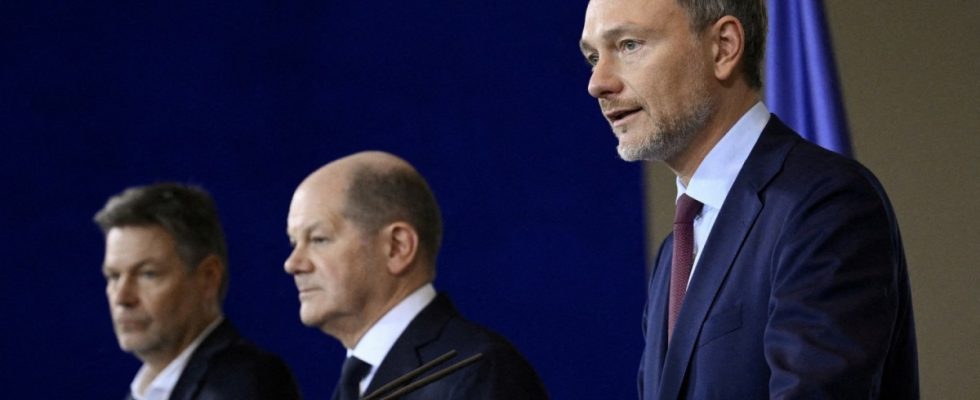The federal government passed the resolution on Monday by circulation – one day before the planned government declaration by Chancellor Olaf Scholz (SPD) in the Bundestag. According to the government draft for the supplementary budget, the Bundestag should once again declare an emergency for 2023, which will allow new borrowing above the debt brake.
The federal government justifies this approach with the high energy prices as a result of the Russian war of aggression against Ukraine and with the flood disaster in the Ahr Valley in 2021. The federal government had set up special funds for both purposes in order to mitigate the consequences for citizens – both special funds can be used according to the However, the judgment of the Federal Constitutional Court can no longer be used in its previous form. The judges require that loans from special government funds be counted against the debt brake annually – and not just in the year in which the funds were set up.
The government’s Climate and Transformation Fund (KTF) is directly affected by the ruling; Because the transfer of 60 billion euros from old Corona loans to the fund was declared null and void, these funds are no longer available. Nevertheless, government circles said that the KTF had sufficient funds for 2024 to make planned and legally binding expenditure. However, the judge’s ruling also indirectly affects the Economic Stabilization Fund (WSF), which has so far financed the electricity and gas price cap. The expenditure from the WSF for the current year, which is expected to amount to 43.2 billion euros – just like the 1.6 billion euros for reconstruction in the Ahr Valley – should now be covered by the planned supplementary budget, which will be in first reading this week should be discussed in the Bundestag.
According to Lindner, the new debt is ultimately lower than planned
According to the draft supplementary budget, the federal government is taking on new debts amounting to 70.6 billion euros this year; Only 25.8 billion would be permitted under the rules of the debt brake. The additional new credit authorizations – as a replacement for the no longer available loans from the special funds – are to be anchored in the Budget Financing Act. Federal Finance Minister Christian Lindner (FDP) emphasized that the federal government was drawing the consequences of the Karlsruhe ruling with the supplementary budget. The federal government will not take on any additional debt in 2023, but will actually take on less debt than originally planned.
The WSF is scheduled to close at the end of the year. If the traffic light coalition wants to continue the electricity and gas price brake, as representatives of the SPD and the Greens are demanding, the money for this would have to come from the regular 2024 budget. But there is one exception: two billion euros for hardship cases regarding the energy costs of hospitals, for which there are legally binding commitments from the federal government. This amount will now also be included in the supplementary budget for 2023.
Meanwhile, it remains controversial between the coalition parties whether the Bundestag should declare an emergency again in 2024 in view of the war in Ukraine in order to be able to exceed the permitted new debt limit of 0.35 percent of economic output. SPD leader Saskia Esken has already called on the FDP to agree to this approach in order to have scope for additional investments. “We are in really multiple and serious crises,” she said on Monday in Berlin. Since the instruments chosen so far “clearly do not correspond to the constitution,” she is in favor of declaring an emergency again. The war in Ukraine requires ongoing further aid, including military support. In addition, Germany will host a reconstruction conference in the spring and must also plan extensive funds for this area. The exception for 2024 is “urgently necessary”.
When asked whether the Chancellor would have to ask the Bundestag for a vote of confidence and call for new elections, as Bavarian Prime Minister Markus Söder (CSU) had demanded, Esken said she wanted to “thank you very much for the advice from Bavaria.” The coalition will find a solution.
Unlike the WSF, the government’s climate fund can remain in existence because it has its own resources, such as income from CO₂ pricing. The federal and state governments agree that they do not want to forego the planned industrial projects that are to be financed through the fund. “All the projects we have designed must become possible,” said Federal Economics Minister Robert Habeck (Greens) after a meeting with the energy ministers of the federal states. Existing promises would have to be honored and promises made would have to be made quickly.
This also includes billions in state aid for the establishment of chip factories. Bavaria’s Economics Minister Hubert Aiwanger (Free Voters) spoke of a “cold shower” that hit Germany’s economy with the ruling from Karlsruhe. “We cannot do without these projects. I would like to say this clearly on behalf of all economic ministers.” The co-chair of the Green Party, Omid Nouripour, also warned of financial cuts. Saving money is not an option. The modernization of the country must progress and Germany must not lose its competitiveness.

